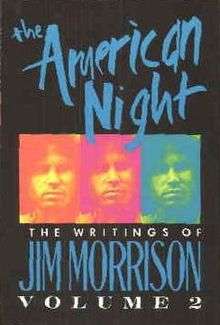The American Night

The American Night [1] is a volume of poetry written by Jim Morrison, front-man for the 1960s psychedelic rock group, The Doors, and published posthumously in 1991, 20 years after his death (to the month) by Random House under the trade name imprint Villard Publishing. The book is structured into 10 sections. The title is eponymous with a poem that appears on the album American Prayer, itself a collection of spoken word and musical vignettes released in 1978.
The book consists of his theories on night which the publisher describes as containing "nightmarish images, bold associative leaps, and [a] volcanic power of emotion" and being "the unmistakable artifacts of a great, wild voice and heart."[2]
The American Night is a follow-up and second volume to Wilderness: The Lost Writings of Jim Morrison (first published in 1989).[3]
Influences
Morrison's work is often compared to that of French poet Arthur Rimbaud, specifically from his collection Illuminations (poetry collection). [4] Morrison once wrote in a letter to the translator of Rimbaud's collection, "Thanks for doing the Rimbaud translation. I read French but not too easily and I needed your translation. I am a rock singer and your book travels with me wherever I go." [5]
Not only did Morrison read Rimbaud passionately, but his work seems to be inspired by him. Both poets entertain nontraditional formats for their poetry, Rimbaud implementing the prose style while Morrison often played around with space in The American Night. They both stray from normal rhythm and verse. Their shared defiance of societal norms and desires to be known to the world as poets shines through in their defiant structure and tone.[6] Both authors wrote consistently of death in a way that questioned the living, and both bring mythology as well as concepts of life after death into their poetry[1][7]
Controversy
The American Night has remained controversial because of the way it was published. When Morrison was discovered dead in a Paris hotel room in 1971, the writings that would later become this publication were found along with him.[8] While there seem to have been no directions from Morrison, the author, that the writings he left behind were meant for publication, there was a longtime race to make sure the work was seen by the public. Morrison's longtime companion and common-law wife Pamela Courson was one of the first to take on the task of attempting to publish Morrison's works, and though she passed away before she was successful in her endeavors, her family took on her mission and looked to do the same, as their daughter had been named Morrison's sole heir shortly after her own death. Copies of Morrison's manuscripts, however, reportedly fell into the hands of a few fans who also looked to publish the poetry. When those fans would eventually resolve those publishing rights, Courson's family became able to publish Wilderness, and The American Night, which both sold remarkably well.[9]
At the same time, questions arose as to whether or not it was ethical to publish Morrison's works after his death when he gave no indication that this was his intention. A friend of Morrison's was quoted as saying, "'If something was thrown in a wastebasket by Cezanne, I don't think it should hang in a museum'...'What about the sanctity of the writer?'" The two collections were also published under the name "Jim Morrison" as opposed to the name Morrison usually gave his publisher, "James Douglas Morrison," calling into question why exactly the works were published and why it was done in this way. When asked why the books were placed in a store in the music section rather than with the poetry, a storeowner admitted that "[t]hey sell better."[10]
References
- 1 2 Morrison, Jim (30 July 1991). The American Night: The Writings of Jim Morrison, Vol. 2 (1st ed.). Villard Publishing. ISBN 978-0679734628.
- ↑ "Product page for The American Night". Random House website. Retrieved 25 December 2014.
- ↑ Morrison, Jim (17 December 1989). Wilderness: The Lost Writings of Jim Morrison, Volume 1 (1st ed.). Villard Publishing. ISBN 978-0679726227.
- ↑ Rimbaud, Arthur. Illuminations, and Other Prose Poems. New Directions Publishing, 1957
- ↑ BROESKE, PAT (1991-03-10). "Knocking at Doors of Academic Acceptance". Los Angeles Times. ISSN 0458-3035. Retrieved 2018-03-25.
- ↑ Fowlie, Wallace. Rimbaud and Jim Morrison: The Rebel as Poet. Duke University Press, 1994.
- ↑ Rimbaud, Arthur. Illuminations, and Other Prose Poems. New Directions Publishing, 1957
- ↑ “The Last Days of Jim Morrison.” Rolling Stone, no. 952/953 (July 8, 2004): 68–80.
- ↑ Saroyan, Wayne A. (March 22, 1989). "The Twisted Tale Of How Late Rocker Jim Morrison`s Poetry Found". Chicago Tribune. Retrieved 2018-03-25.
- ↑ BROESKE, PAT H. (1991-03-10). "A Rebel's Verse : The Doors' Jim Morrison made his mark as a rocker, but 20 years after his death it is his poetry that is attracting new attention". Los Angeles Times. ISSN 0458-3035. Retrieved 2018-03-25.